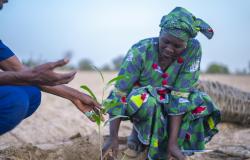The rush for clean-energy minerals risks fuelling conflict in the Sahel – and that has to be on the climate agenda

Mohamadou Fadel Diop on why climate negotiations such as the upcoming COP28 must pay attention to how the energy transition may drive further conflict and instability in West and Central Africa.
The West African subsoil holds hundreds of billions of dollars of the minerals the world needs for a clean-energy transition such as lithium. But will the people who live there benefit from the transition?
In this blog, I set out why the drive for clean-energy minerals risks fuelling conflict and instability in the region, just as the rush to exploit extractives such as oil has; and why the people of West and Central Africa, who are especially vulnerable to climate change, need not only peace but also the power to influence how clean-energy minerals are governed so they can benefit in the new, low-carbon economy.
Lessons from the past struggle for natural resources
The past exploitation of natural resources in West and Central Africa, instead of leading to prosperity, has generated consistent inequalities that some have called a “natural resource curse”. As an elite reaps vast rewards and the benefits of illicit financial flows, poverty and inequalities persist, fuelling the frustration of disadvantaged populations, and providing a breeding ground for conflict, rebellion and war.
In a passage linking natural resources and insecurity, Cameroonian philosopher Achille Mbembe explains the “frantic race to privatise the resources of the soil and subsoil.” He says: “Major regional markets for violence have emerged, involving all kinds of profit-seeking players, from multinationals to private military security services. Their main function is to exchange protection for privileged access to scarce resources. Thanks to these new forms of barter, Africa’s ruling classes are able to secure their stranglehold on the state, secure the major areas of extraction, militarise exchanges far and wide, and consolidate their ties to the transnational networks of finance and profit.”
While much of the media attention to the recent surge in conflict in West and Central Africa has been on coups and armed raids, behind this lies an ongoing cause of instability: a fierce competition at work to secure the strategic minerals that abound in Africa’s subsoil. It’s clear that the winds of revolt currently blowing through West and Central Africa are not only caused by the limits of democratic and security governance: among other interrelated factors, the issue of natural resource governance is particularly significant. It has been for a long time, as everybody has seen in the Niger Delta.
But today, with the rapid march towards Net Zero by 2050 and the intensifying competition for clean-energy minerals, African states need to urgently think about the right options for governing their natural resources, or risk condemning their people to poverty, conflict, famine and exile, while the rest of the world enjoys the benefits of a greener planet.
Conflict and instability increase vulnerability to climate crises
While the governance deficit in natural resources sector risks driving conflict, it is also true that conflict itself is driving climate vulnerability. Terrorism and armed conflict erode resilience in the face of climate change, undermining the institutions, essential services, infrastructure and governance that are essential to strengthening resilience.
The International Committee of the Red Cross (ICRC) says “people in conflict situations are not only among the most vulnerable to climate and environmental crises, but they are also among the most neglected by climate action, in part because of the challenges of working in such an environment”.
Meanwhile, regional cooperation institutions such as ECOWAS (the Economic Community of West African States – note Burkina Faso, Niger, Mali and the Republic of Guinea have been suspended from ECOWAS), CEMAC (The Central African Economic and Monetary Community) and the African Union have been weakened, even though they should be the cornerstones of African states’ response to climate change.
And all this in a region already facing environmental challenges. According to the IPCC (Intergovernmental Panel on Climate Change), the world’s foremost scientific authority on climate change, the Sahel and West Africa are among the regions most vulnerable to future climate fluctuations. It’s a region rich in natural resources, but one that is losing them while failing to ensure that the essential needs of the people who live there are met. Simple things like going to school or feeding your child.
The sahel needs climate justice, social justice and peace
It seems the march of history is reaching a crossroads where there is a need to rethink how our ways of living on earth intersect with the aspirations of Africa’s youth to escape the poverty that threaten them, and their future children and grandchildren. As the world moves towards an energy transition, West African people need self-determination in how they manage their natural resources so they can freely enjoy the benefits. These countries have the opportunity to use their natural resources to build low-carbon societies to support industrialisation, job creation and economic development. But they will not be able to if security and climate issues are viewed separately.
At last week’s African Climate Summit, African negotiators met with representatives of the international community to debate decisions about the future of natural resources – and they will again at the upcoming COP28. They will talk about energy transition, agro-ecological transition and climate financing, but in the end, they will return to implement these decisions in a Sahel that is in turmoil. All the negotiators at global climate talks need to appreciate that the costs of adapting to climate change will continue to soar if security risks are not factored into the climate response.
The security context in West Africa should be a major issue in the climate negotiations. It deserves more attention, more research, more rigorous evidence-based analysis to guide how we best implement the climate agenda in the Sahel and the rest of West Africa. Because, just as we cannot let the earth burn, we cannot let conflict fuelled by the scramble for natural resources rage – and time is running out to act on both.
Mohamadou Fadel Diop is Research, Policy and Innovation Advisor, Oxfam in Senegal.
This first appeared on Oxfam's Views and Voices and was reposted with permission.
Image: Djelika a farmer in Mali has been supported by the EU-funded Regreening Africa project run by Oxfam and partners Sahel Eco, World Agroforesty Center (ICRAF), and World Vision. It aims to reverse land degradation and build climate resilience by encouraging smallholders to grow trees. Farmers across West Africa face huge climate challenges that will be exacerbated if regional conflict increases (picture: Diafara Traoré/Oxfam).


